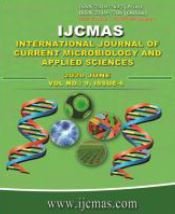


 National Academy of Agricultural Sciences (NAAS)
National Academy of Agricultural Sciences (NAAS)

|
PRINT ISSN : 2319-7692
Online ISSN : 2319-7706 Issues : 12 per year Publisher : Excellent Publishers Email : editorijcmas@gmail.com / submit@ijcmas.com Editor-in-chief: Dr.M.Prakash Index Copernicus ICV 2018: 95.39 NAAS RATING 2020: 5.38 |
The productivity of the guava fruit is mainly ravaged by the fruit flies, Bactrocera spp. and found to be the major devastating insect pest that causes extensive damage. Fruit flies cause direct damage to fruit by oviposition punctures followed with the feeding of maggots. The greatest threat influenced by the fruit flies is the rejection of harvested fruits in markets and exporters especially in case of guava due to the presence of maggots, it leads fruit becoming unfit for marketing and consumption. To overcome this problem basic knowledge on the scientific reasons behind the preference towards the guava fruits exerted by the fruit flies to be ascertained. The ovipositional preference of the fruit flies may vary depends upon the fruit phenology viz., size, ripeness, odor and thickness of pericarp etc., Thus, the present investigation on preference of fruit flies in relation to fruit size and ripeness in guava was carried out by sampling and assessment of maggot population, pupal percentage, adult emergence and sex ratio in intact and fallen fruits. The overall sampling study revealed that the maggot population was more in large sized fruits i.e., 30 – 50 per fruit in fallen condition and 20 – 30 in intact fruits and the adult emergence was also more in the large sized fruits ( > 70%) when compared with the small and medium sized fruits. Comparing the intact and fallen fruits, the fallen fruit shows the higher population (41.67/fruit) and intact fruits shown comparatively less population (24.75/fruit). The infestation of B. caryeae was higher than the B.dorsalis and sex ratio recorded shows the male population is more in B.dorsalis whereas the male and female seems to be present in equal ratio in case of B. caryeae.
 |
 |
 |
 |
 |